
_________
In Edward Clay's days as the British High Commissioner in Nairobi, he used to insult the country’s leadership and Kenyans at large. His insults were a reminder of what his forekin, the colonists, subjected Africans to. For all his insults and foul language, Clay used to be showered with praises and hand clapping by a good section of the local media. He was a hero of sorts who was sure to grab headlines whenver he opened his mouth. I was, perhaps, the only commentator who did not take pride when that Mzungu used to verbally assault us. I penned down several op-ed commentaries to that effect.
Then, suddenly other Nairobi-based diplomats took a cue from Clay (after he departed) such as the then German Ambassador and began insulting our leaders and people. Who would have thought that some seasoned journalists started to defend the country from the "diplomats" insults? Although, I made an inference to veteran scribe Philip Ochieng (and I wrote to him personally) one of the reasons he penned down a strong commentary in defence of Kenya was because his "home boy" Raphael Tuju had then since been appointed a Foreign Minister. Other scribes, like Columnist Kwamchesti Makhokha praise magazines like The Economist for castigating the Government.
It all started when the Finance Minister was forced to withdraw the Government from what was to be a high-level political and business forum dubbed “The First Business Roundtable with the Government of Kenya.” The two-day conference was to take place in Nairobi on July 17-18 and would have been graced by none other that the Head of State, President Mwai Kibaki amongst other distinguished guests and participants.
It all started when the Finance Minister was forced to withdraw the Government from what was to be a high-level political and business forum dubbed “The First Business Roundtable with the Government of Kenya.” The two-day conference was to take place in Nairobi on July 17-18 and would have been graced by none other that the Head of State, President Mwai Kibaki amongst other distinguished guests and participants.
Personally, I was very proud that the Government took the position to cancel the conference. There is no point in agreeing to participate in a meeting organized by a group and or a company that has no confidence in or looks down on the Government. My point is not to say that The Economist article was right or wrong, whether it was based on fact or illusions. The point I want to stress here is the fact that Makhokha’s Memos castigate the Government for cancelling the event and believes that what the magazine was saying was the truth.
I kept wondering, if Kenya is in such a depitated state as the article seems to suggest, why then are there more foreign correspondents in Nairobi than in any other African country? Why do many foreigners who get posted in Kenya refuse to leave the country after their call of duty ends? Why haven’t all those foreign reporters particularly those of The Economist shifted their bases to say Addis Ababa, Dar es Salaam, Kampala or Lusaka?
My beef is with the Kenyan media people and other commentators who see nothing wrong when foreign media insults them and their people. Clay was feted by the local media; he became a celebrity in Kenya simply because he was good at insulting us.
I can boldly say that, we have formed a habit of heaping praise on the foreigners who we glorify for castigating us and belittle our own leaders. I say, Kudos Amos Kimunya for your quick intervention to stop” The First Business Roundtable with the Government of Kenya.” You stood up and defended our dignity.
My beef is with the Kenyan media people and other commentators who see nothing wrong when foreign media insults them and their people. Clay was feted by the local media; he became a celebrity in Kenya simply because he was good at insulting us.
I can boldly say that, we have formed a habit of heaping praise on the foreigners who we glorify for castigating us and belittle our own leaders. I say, Kudos Amos Kimunya for your quick intervention to stop” The First Business Roundtable with the Government of Kenya.” You stood up and defended our dignity.
*******************
Moi appointment most deserved
Kwame Nkrumah was a very famous African son. A firm believer in African liberation, Nkrumah pursued a radical Pan-African policy, playing a key role in the formation of the Organisation of African Unity, the forerunner of the present day Africa Union.
However, as the head of government of his native Ghana, Nkrumah was less successful, and as time passed he was accused of forming a dictatorship. It is so sad that Ghana’s first Prime Minister and later President formed a one-party state, with himself as President for life, and was accused of actively promoting a cult of his own personality. He was later overthrown by the military and spent the rest of his life in exile, dying in Bucharest, Romania in 1972. Although, revered by many Africans where his legacy and dream of a “United States of African” still remains a goal among many African people to date.
There are some similarities between Kwame Nkrumah and our own second President Daniel Toroitich arap Moi. For almost a quarter of century as the country’s Head of State, Moi started very well in his initial years (like Nkrumah did) and then became a dictator. Both these two leaders at different times in history presided in a totalitarian rule in their respective countries. In the meantime these two leaders (again separately) cultivated excellent good rapport with fellow African Head of States. As for Moi he concentrated on regional heads of state particularly within the East and Central Africa sub-region.
President Mwai Kibaki out of respect for his predecessor, named Moi as Special Envoy for Peace and Goodwill to Sudan. While I am not elated with the appointment but I must hasten to add that the appointment makes political sense. Moi needed to be kept busy as his Moi Africa Institute was under-utilized. He has special interests in Southern Sudanese people probably because they are his fellow Christians in a majority Muslim country.
As a Head of State, Moi also participated in what was to later to be known as CPA and as such he will be very conversant in handling and discussion such matters and or affairs. As an envoy, Moi needed to be accepted and gain the confidence of the leaders of the twin Sudanese governments -- the Government of National Unity (GNU) headed by Sudanese military strongman General Omer El-Bashir and the Government of Southern Sudan (GOSS) led by Sliva Kiir, who is also doubles as the GNU's first Vice President. Boldly, speaking, President Moi was larger than life outside the country, but less successful when it comes to Kenyans. Nevertheless, I join hands with my fellow Kenyans and the Sudanese people to wish Moi all the best in his new diplomatic assignment.
********************
'Retail politics' is the way to go
********************
'Retail politics' is the way to go
The mushrooming of regional and or ethnic political parties is not a threat to the country’s unity and democracy. In fact, the opposite is true. These parties have the potential of making Kenya stronger, united and democratic. Those who fail to appreciate these fundamentals of retail politics, seems to me that, they don’t see beyond their noses. It is a fact of life that Kenyans are one people on earth who distinguish themselves first as members of their tribes, then as Kenyans.
When it comes to "tribalism and sectarianism" we’ve got to be honest with ourselves. Either we accept the existence and or presence of tribalism and sectarianism and try to operate around these two issues or we continue to refuse to recognize and accept them and we are doomed to fail as a state and people.
Strong regional and ethnic parties are the only solution for making this country stronger, united and democratic in the real senses of those words. This is why national parties tend to do regional balancing by hand picking individuals from the seven Kenyan provinces (minus the Nairobi area) whether they are the true people representatives or not. For instance, Taib Ali Taib and Marsden Madoka would be the Coast representatives of Kanu whether they are liked by Kanu Coast supporters (if any) or not. Another example is Mukhisa Kituyi who would automatically be the Narc Kenya representative from Western Province, and on and on it goes.
But Shirikisho Party or Ford Kenya or Ford People respectively for Coast, Western and Gusii-Nyanza as regional parties will produce popular leaders of their respective regions for these parties. No hand picking of individuals purportedly to be the leaders of the people.
When these regional and or sectarian parties join hands and form a coalition, like Narc, they bring true and popular leaders of their respective regions -- making the coalition based on a sound foundation and stronger like a brick or stone house. That is why a brand new coalition friendly to President Mwai Kibaki will be unveiled next week. A grand coalition whose ticket Kibaki will seek his Presidential re-election.
When these regional and or sectarian parties join hands and form a coalition, like Narc, they bring true and popular leaders of their respective regions -- making the coalition based on a sound foundation and stronger like a brick or stone house. That is why a brand new coalition friendly to President Mwai Kibaki will be unveiled next week. A grand coalition whose ticket Kibaki will seek his Presidential re-election.
The strategy is to use regional political parties that are deemed popular in their respective regions where these regional leaders will all have a stake in the government whether they hail form small or populous tribes.
In fact the 2002 General Election forever changed the Kenyan political landscape as we knew it.
There is no more room for larger single national parties. Kanu is a prefect example. It has no national appeal anymore. It is now the party of Uhuru Kenyatta with no appeal anywhere other than in Rift Valley and this is simply because the region feels obliged to respect former President Daniel arap Moi and nothing more. Whether we would like to accept this reality or not is one thing, but truth be told, national parties without strong regional and ethnic sub-parties tend to have a free hand where they traditionally tend to favour the larger and or populous tribes because of their numerical strengths.
There is no more room for larger single national parties. Kanu is a prefect example. It has no national appeal anymore. It is now the party of Uhuru Kenyatta with no appeal anywhere other than in Rift Valley and this is simply because the region feels obliged to respect former President Daniel arap Moi and nothing more. Whether we would like to accept this reality or not is one thing, but truth be told, national parties without strong regional and ethnic sub-parties tend to have a free hand where they traditionally tend to favour the larger and or populous tribes because of their numerical strengths.
In doing so the then tends to marginalize the small tribes and for a country with more than forty tribes this is a recipe for a catastrophic political consequence.







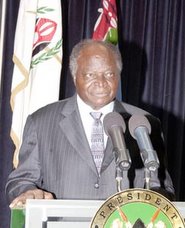


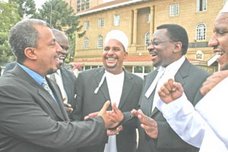
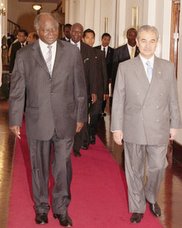

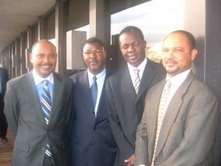
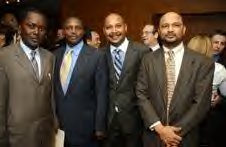
No comments:
Post a Comment